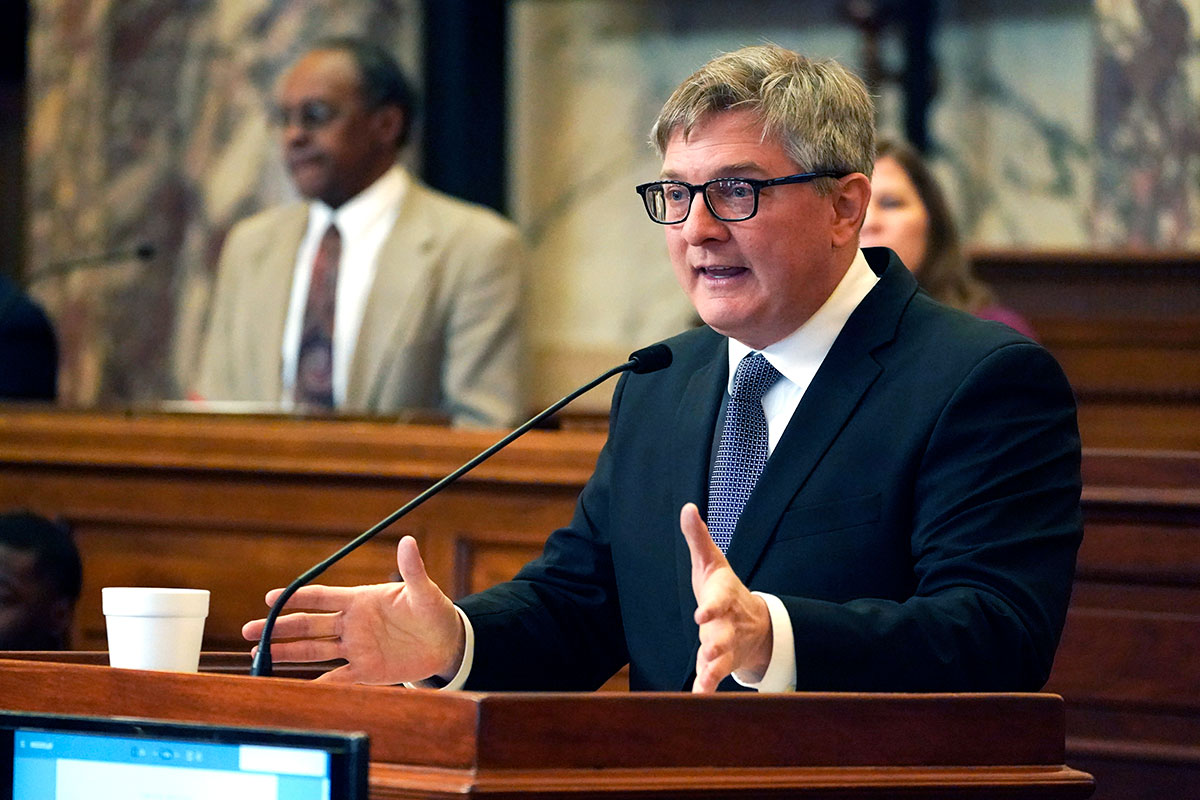Mississippi could protect access to assisted reproductive technology, including in-vitro fertilization, under a compromise bill that members of the state House and Senate agreed to on April 27. The conference report, which lawmakers have since recommitted for further negotiations before either chamber votes on it, originally dealt only with inheritance rights for those born as the result of IVF treatments.
The effort to protect IVF is a response to an Alabama Supreme Court ruling that imperiled access to the procedure in Mississippi’s neighbor to the east in February. U.S. House Rep. Missy McGee, R-Hattiesburg, led the effort to pass an IVF protection bill earlier in the session, but that bill died on a March deadline. The Alabama legislation raised concerns that Mississippi’s strict abortion laws could lead to similar interpretations in the Magnolia State.
Under the April 27 conference report, if unimplanted embryos used for in-vitro fertilization die or suffer damage, the bill says law enforcement would not be able to charge any person, patient or health-care professional for the loss.
“In any civil action or suit brought or maintained against any manufacturer, individual or entity providing products and/or services related to assisted reproductive technology, damages shall be limited to economic damages only, calculated as the price paid for the impacted service,” H.B. 1542 says.
The conferees include Rep. Joey Hood, R-Ackerman; Rep. Shanda Yates, I-Jackson; Rep. Dana McLean, R-Columbus; Sen. Brice Wiggins, R-Pascagoula; Sen. Tyler McCaughn, R-Newton; and Sen. Joey Fillingane, R-Sumrall.

Though Fillingane has been instrumental in passing Mississippi’s most strict abortion laws, he supports protecting IVF.
“We need at some point soon, I would think, given the mounting number of folks like myself who use that process to have families and to expand families—I think it’s just silly in 2024, wouldn’t you agree with me, not to have legislation protecting that particular process in the law?” Fillingane told Wiggins on the House floor on April 10. Wiggins responded that he wanted “the right bill,” but did not think the House’s prior efforts to protect IVF was the right plan.
It is not clear why lawmakers recommitted the bill for further conference. Once they reach a final deal, it would still need to pass in a vote among all members of each chamber before it can go to Gov. Tate Reeves’ desk.
Mental Health Task Force
A new mental health task force will collect and research data to determine Mississippi’s biggest challenges in mental health care for students in K-12 schools, community colleges and universities under a bill Gov. Tate Reeves signed into law on April 22.
Senate Bill 2727 says the task force would research mental health resources, training practices, and workforce landscapes in K-12, college and university systems and give recommendations to the Legislature for new policies and laws. The bill encourages the task force to see if developing a “multi-tiered wellness program” could benefit Mississippi students.
“The task force shall develop recommendations to the Legislature on changes to policy and laws in Mississippi with a goal of better identifying students at all levels struggling with mental health issues; training school, community college and university personnel related to student mental health, and thus improving health outcomes and the probability of student success,” S.B. 2727 says.
Medicaid Expansion Compromise Plan
Mississippi residents making up to 138% of the federal poverty level would qualify for Medicaid expansion under a modified plan the Senate presented to the House on April 26. The Senate’s expansion bill still hinges on a work requirement approval from the U.S. Centers for Medicare and Medicaid Services—a policy the President Joe Biden’s administration has blocked in other states.
Senate Medicaid Committee Chairman Sen. Kevin Blackwell, R-Southaven, told the Mississippi Free Press recently that, under the plan, Medicaid expansion may only happen in Mississippi if former President Donald Trump wins the presidential election in November. The former president’s administration approved work requirements in several Republican-led states.
“Based upon the timing of all this, we may have a different president, and I believe work requirements won’t be an issue,” Blackwell told the Mississippi Free Press on April 26.

Like its original plan, the Senate’s proposed compromise proposal still requires CMS to approve a work requirement of 120 hours a month for anyone receiving expanded Medicaid. The compromise proposal calls for Attorney General Lynn Fitch to appeal in federal court if CMS denies the work requirement waiver but that could lead to a lengthy legal process that could stall Medicaid expansion from going into effect for years.
Trump is currently facing 88 felony criminal indictments across four jurisdictions, including state charges in New York and Georgia and federal charges in Florida and Washington, D.C. The ex-president is currently on trial in New York over hush-money payments made during the 2016 election while a federal trial in the nation’s capital over his plot to overthrow the 2020 election awaits a U.S. Supreme Court ruling on his claims of presidential immunity from prosecution.’
The House has insisted on a full Medicaid expansion plan that would not depend on work requirements. It is not clear yet whether House conferees will agree to the Senate’s proposed compromise plan, which boosts the eligibility threshold from up to 100% of the federal poverty line to 138%, but still would not take effect without the federal government approving work requirements.
Read more about the Medicaid expansion proposal here.
A New Student-Funding Formula
Mississippi could soon do away with a 27-year-old school-funding formula that the Legislature only ever fully funded twice in favor of a new one that prioritizes more equitable for certain student populations, such as those with learning disabilities and those in impoverished districts.
The Mississippi Student Funding Formula, which is based on an earlier House plan called the INSPIRE Act, would replace the older Mississippi Adequate Education Program that lawmakers adopted in 1997.
Both the House and Senate have passed the bill, which is the result of a compromise between House and Senate members, and sent it to Gov. Tate Reeves’ desk for his signature. The governor previously endorsed the INSPIRE Act.
Read more about the new funding formula here.
Dead Appropriation Bills
Dozens of appropriation bills allocated to various organizations died in the House and Senate on April 27. Legislative leaders must revive those bills in order to ensure necessary state functions receive funding.
The 2024 legislative session is set to end on Thursday, May 2.










